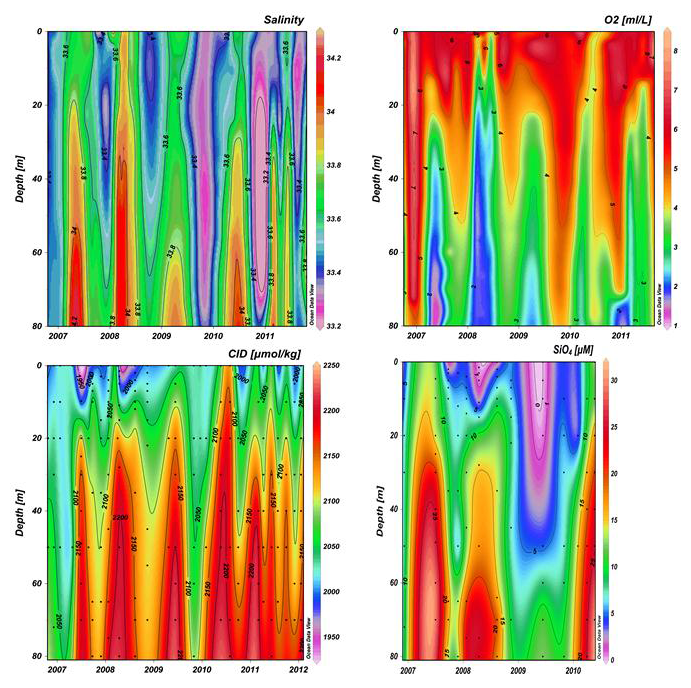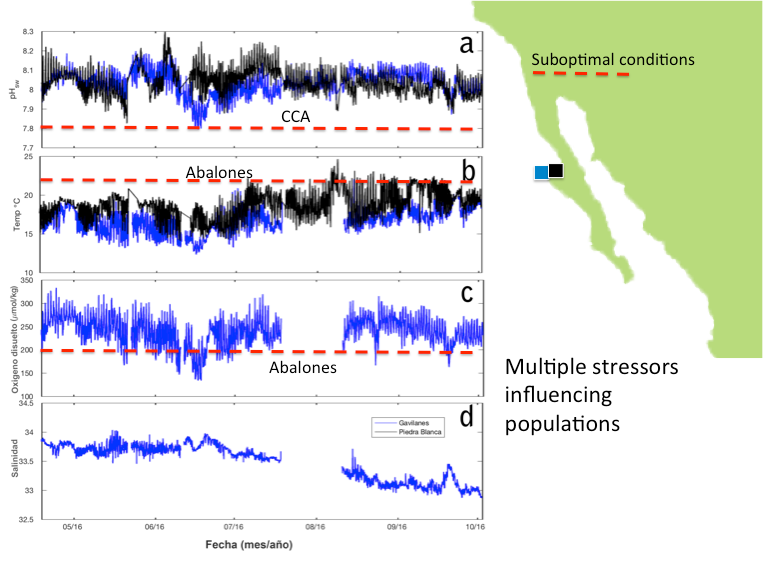Gulf of California
Lab. Dra. Letica Espinoza, CIIDIR-GUASAVE-SINALOA-IPN
The Gulf of California (GC) is a unique among semicloses seas, with high physical dynamic (currents, mesoscale processes, coastal upwelling). The carbon system references were centered in a Grandes Islas region.
In 2016 began a research cruises with the Mexican Navy in (1) coastal upwelling in the north of Sinaloa, (2) Guaymas (Son), (3) Mulege and Bahía Concepción (BCS), (4) Mazatlán (Sin).
Ongoing projects
- Monitoring of buoy (Coordinator: Leticia Espinosa)
- Collaboration with Mexican Navy and UNAM on research cruises. Get funding!
We need to know
- Influence of coastal processes on OA
- The amount of anthropogenic CO2
- Adaptation strategies by the biota
Mexican Central Tropical Pacific
Dr. Ramon Sosa, UCOL
What we know so far:
The pH is low ~ 7.5 near the surface and ΩA < 1 in March and April due to coastal upwelling, and DIC and pCO2 are high in Manzanillo bays. The ocean acts as a source of CO2. In other months of the year, the pH is high with values of 7.6 below 40 m depth, the ocean is a CO2 sink.
Off the coast of Colima, low values of pH ~ 7.6 are below 60 m depth. However, in the Mexican central tropical Pacific high pH values are observed in surface waters and of 7.7 between 100 and 200 m depth. In this region we have the OMZ.
Gulf of Tehuantepec
Lab. Dra. Cecilia Chapa, UMAR-Oaxaca
The Gulf of Tehuantepec (GOT) is a highly dynamic region, with the lowest pH and ΩAr values in mexican waters. pH values as low as 7.5 and ΩA<2 are found at 30m depth near the coast, and pH=7.7 at the surface (Tehuanos). pH at Huatulco Coral communities pH can reach 7.6.
Ongoing projects
- Two projects for monitoring of ocean acidification and its effect on reef communities from the mexican south Pacific (Coordinator : Andrés López-Pérez) Huatulco and Veracruz (Coordinator: Cecilia Chapa-Balcorta). Timeseries and discrete samples.
- Colaboration with the Mexican Navy on research cruises (discrete water samples).
What we don't know
- The amount of anthropogenic CO2
- The duration and intensity of sensitive species exposure to low pH
- Influence of Coastal processes on OA
- Adaptation strategies developed by the biota of this region
Ensenada Station
Dr. Ruben Lara Lara

Isla Natividad
Dr. Rodrigo Beas













